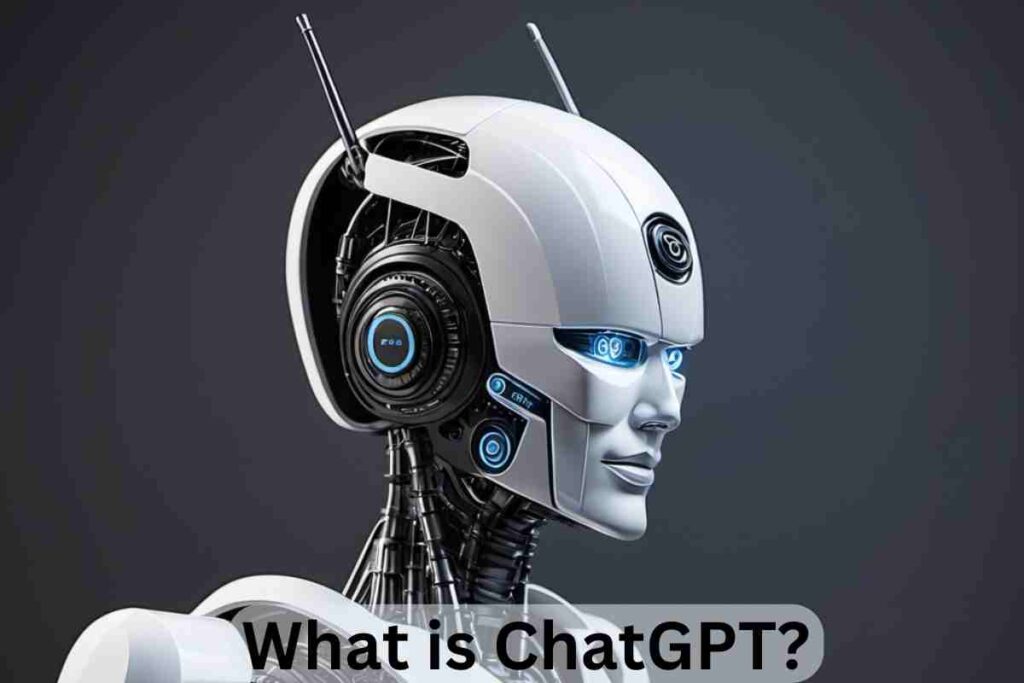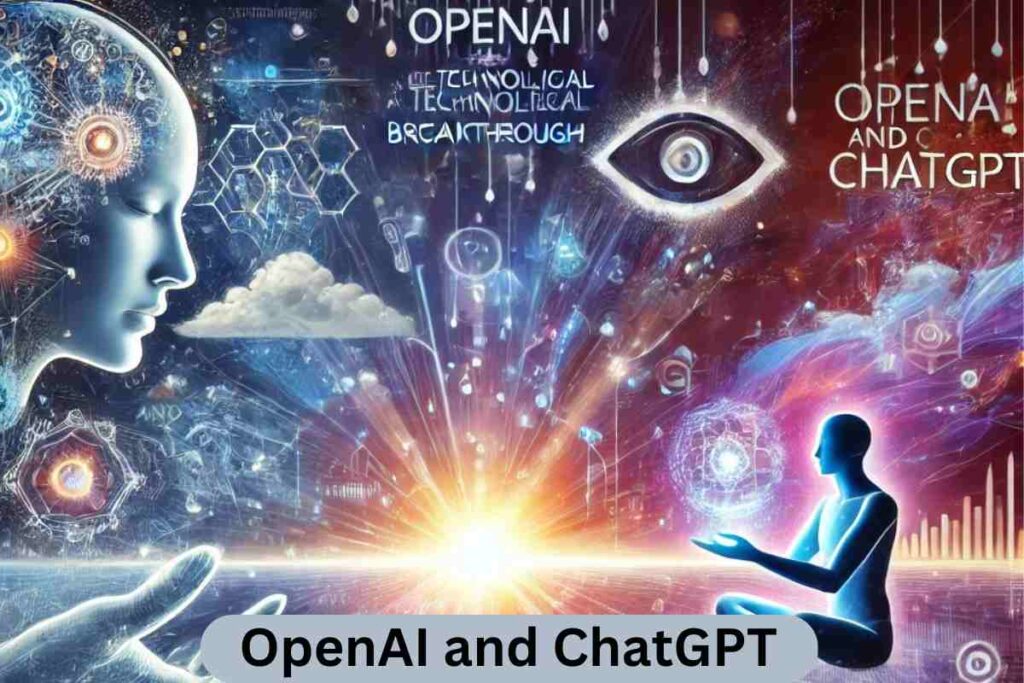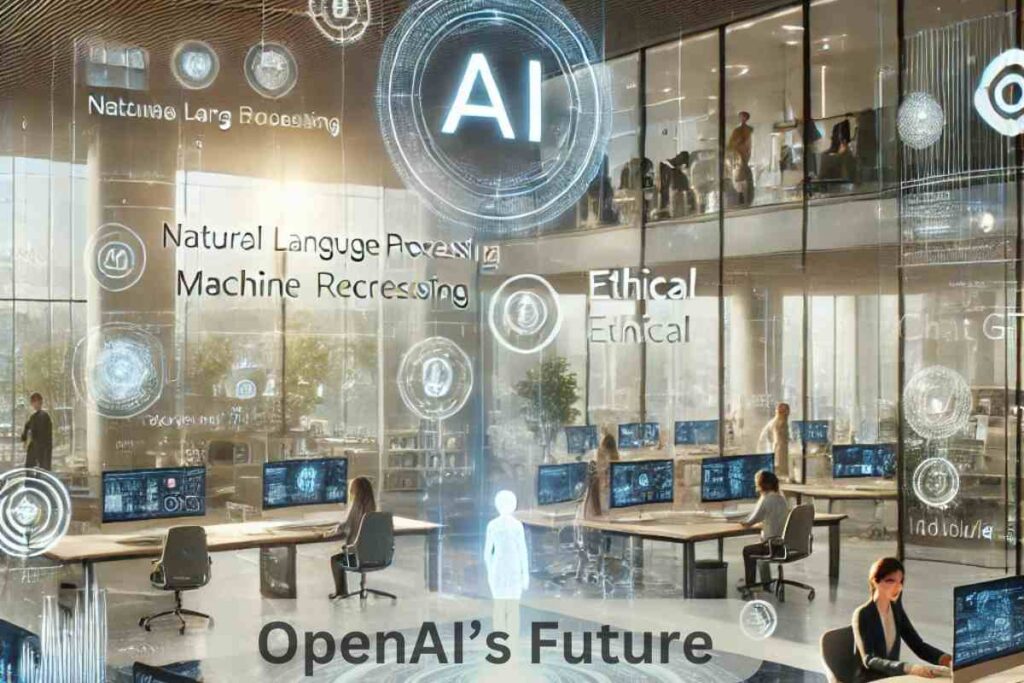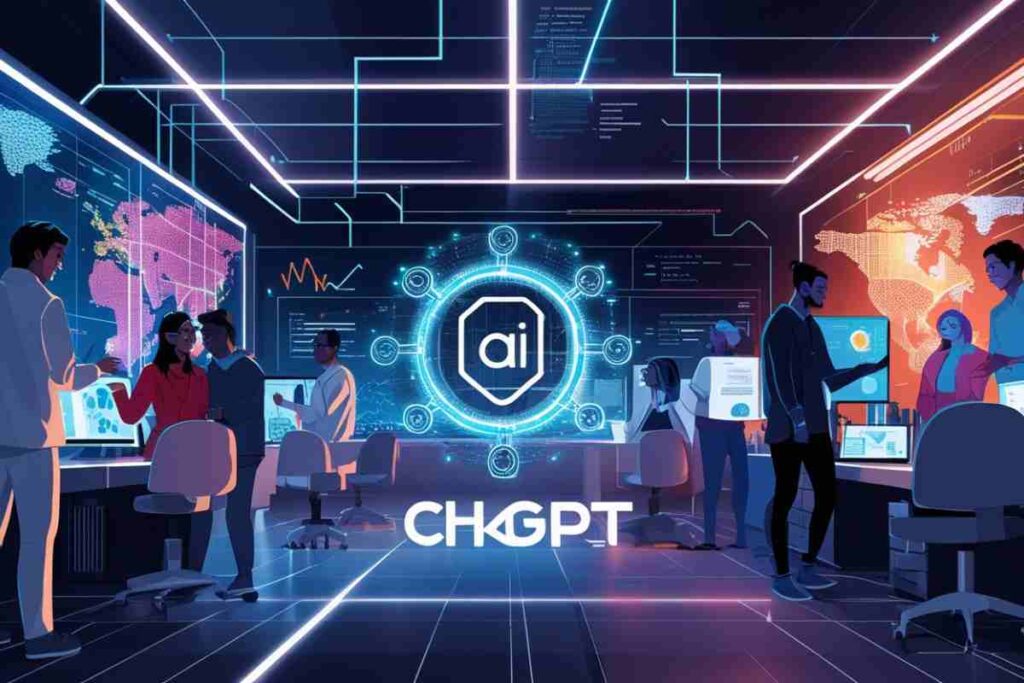In the rapidly evolving field of artificial intelligence, OpenAI has emerged as a trailblazer. As the creator of ChatGPT and other transformative AI technologies, OpenAI is redefining how machines interact with humans.
From natural language processing breakthroughs to the vision of safe and beneficial artificial general intelligence (AGI), this article explores OpenAI’s history, mission, and the innovation driving tools like ChatGPT, The Company Behind ChatGPT.
What is ChatGPT?

ChatGPT is an AI-powered chatbot developed by The Company Behind ChatGPT, OpenAI. It is based on advanced machine learning models that generate human-like text responses based on user prompts.
Leveraging advanced machine learning techniques, particularly a model called a “transformer,” ChatGPT can engage in conversations, write articles, generate poetry, and even provide coding assistance.
It understands and responds to natural language, making it an incredibly versatile tool for various applications.
{ “@context”:”https://schema.org”, “@type”:”WebPage”, “headline”:”The Company Behind ChatGPT: OpenAI’s Vision and Mission”, “url”:”https://blog.rteetech.com/the-company-behind-chatgpt-a-crossword-clue-journey/?preview_id=886&preview_nonce=ec2eeacff5&preview=true&_thumbnail_id=2972″, “description”:”Learn about OpenAI, the company behind ChatGPT, its mission to create safe AI, and how it’s transforming industries with advanced AI technology”, “keywords”:[“chatgpt”,”openai”,”model”,”users”,”models”,”chatbot”,”language”,”technology”,”altman”,”research”,”musk”,”people”,”data”,”version”,”team”,”google”,”intelligence”,”time”,”voice”,”access”,”gpt”,”board”,”a.i”,”search”,”ceo”,”content”,”text”,”code”,”products”,”release”,”questions”,”tool”,”elon”,”tech”,”years”,”year”,”gpt-4″,”companies”,”microsoft”,”investment”], “about”: [{“@type”: “Thing”, “name”: “chatgpt”, “sameAs”: [“https://en.wikipedia.org/wiki/ChatGPT”,”https://www.google.com/search?q=chatgpt&kgmid=”]},{“@type”: “Thing”, “name”: “openai”, “sameAs”: [“https://en.wikipedia.org/wiki/OpenAI”,”https://www.google.com/search?q=openai&kgmid=”]},{“@type”: “Thing”, “name”: “ai”, “sameAs”: [“https://en.wikipedia.org/wiki/Artificial_intelligence”,”https://www.google.com/search?q=ai&kgmid=/m/0mkz”]},{“@type”: “Thing”, “name”: “microsoft”, “sameAs”: [“https://en.wikipedia.org/wiki/Microsoft”,”https://www.google.com/search?q=microsoft&kgmid=/m/04sv4″]},{“@type”: “Thing”, “name”: “chatbot”, “sameAs”: [“https://en.wikipedia.org/wiki/Chatbot”,”https://www.google.com/search?q=chatbot&kgmid=/m/01305y”]},{“@type”: “Thing”, “name”: “elon musk”, “sameAs”: [“https://en.wikipedia.org/wiki/Elon_Musk”,”https://www.google.com/search?q=elon+musk&kgmid=/m/03nzf1″]},{“@type”: “Thing”, “name”: “sam altman”, “sameAs”: [“https://en.wikipedia.org/wiki/Sam_Altman”,”https://www.google.com/search?q=sam+altman&kgmid=/m/02kx06l”]},{“@type”: “Thing”, “name”: “musk”, “sameAs”: [“https://en.wikipedia.org/wiki/Musk”,”https://www.google.com/search?q=musk&kgmid=/m/01g7vm”]},{“@type”: “Thing”, “name”: “google”, “sameAs”: [“https://en.wikipedia.org/wiki/Google”,”https://www.google.com/search?q=google&kgmid=/m/045c7b”]},{“@type”: “Thing”, “name”: “artificial intelligence”, “sameAs”: [“https://en.wikipedia.org/wiki/Artificial_intelligence”,”https://www.google.com/search?q=artificial+intelligence&kgmid=/m/0mkz”]},{“@type”: “Thing”, “name”: “generative ai”, “sameAs”: [“https://en.wikipedia.org/wiki/Generative_artificial_intelligence”,”https://www.google.com/search?q=generative+ai&kgmid=”]},{“@type”: “Thing”, “name”: “chatgpt plus”, “sameAs”: [“https://en.wikipedia.org/wiki/ChatGPT”,”https://www.google.com/search?q=chatgpt+plus&kgmid=”]},{“@type”: “Thing”, “name”: “gpt-4”, “sameAs”: [“https://en.wikipedia.org/wiki/GPT-4″,”https://www.google.com/search?q=gpt-4&kgmid=”]},{“@type”: “Thing”, “name”: “gpt”, “sameAs”: [“https://en.wikipedia.org/wiki/Generative_pre-trained_transformer”,”https://www.google.com/search?q=gpt&kgmid=”]},{“@type”: “Thing”, “name”: “ceo”, “sameAs”: [“https://en.wikipedia.org/wiki/Chief_executive_officer”,”https://www.google.com/search?q=ceo&kgmid=/m/0dq_5″]},{“@type”: “Thing”, “name”: “twitter”, “sameAs”: [“https://en.wikipedia.org/wiki/Twitter”,”https://www.google.com/search?q=twitter&kgmid=/m/0289n8t”]},{“@type”: “Thing”, “name”: “ilya sutskever”, “sameAs”: [“https://en.wikipedia.org/wiki/Ilya_Sutskever”,”https://www.google.com/search?q=ilya+sutskever&kgmid=”]},{“@type”: “Thing”, “name”: “tesla”, “sameAs”: [“https://en.wikipedia.org/wiki/Tesla,_Inc.”,”https://www.google.com/search?q=tesla&kgmid=/m/0dr90d”]},{“@type”: “Thing”, “name”: “greg brockman”, “sameAs”: [“https://en.wikipedia.org/wiki/Greg_Brockman”,”https://www.google.com/search?q=greg+brockman&kgmid=/m/013ddj9d”]},{“@type”: “Thing”, “name”: “large language models”, “sameAs”: [“https://en.wikipedia.org/wiki/Large_language_model”,”https://www.google.com/search?q=large+language+models&kgmid=”]}], “mentions”: [{“@type”: “Thing”, “name”: “claude-2”, “sameAs”: [“https://en.wikipedia.org/wiki/Anthropic”,”https://www.google.com/search?q=claude-2&kgmid=”]},{“@type”: “Thing”, “name”: “openai incorporated”, “sameAs”: [“https://en.wikipedia.org/wiki/OpenAI”,”https://www.google.com/search?q=openai+incorporated&kgmid=”]},{“@type”: “Thing”, “name”: “openai lp”, “sameAs”: [“https://en.wikipedia.org/wiki/OpenAI”,”https://www.google.com/search?q=openai+lp&kgmid=”]},{“@type”: “Thing”, “name”: “bots”, “sameAs”: [“https://en.wikipedia.org/wiki/Chatbot”,”https://www.google.com/search?q=bots&kgmid=/m/01305y”]},{“@type”: “Thing”, “name”: “llama-2”, “sameAs”: [“https://en.wikipedia.org/wiki/LLaMA”,”https://www.google.com/search?q=llama-2&kgmid=”]},{“@type”: “Thing”, “name”: “board of openai”, “sameAs”: [“https://en.wikipedia.org/wiki/OpenAI”,”https://www.google.com/search?q=board+of+openai&kgmid=”]},{“@type”: “Thing”, “name”: “openai’s”, “sameAs”: [“https://en.wikipedia.org/wiki/OpenAI”,”https://www.google.com/search?q=openai’s&kgmid=”]},{“@type”: “Thing”, “name”: “openai inc”, “sameAs”: [“https://en.wikipedia.org/wiki/OpenAI”,”https://www.google.com/search?q=openai+inc&kgmid=”]},{“@type”: “Thing”, “name”: “gpt-3”, “sameAs”: [“https://en.wikipedia.org/wiki/GPT-3″,”https://www.google.com/search?q=gpt-3&kgmid=”]},{“@type”: “Thing”, “name”: “generative pre-trained transformer”, “sameAs”: [“https://en.wikipedia.org/wiki/Generative_pre-trained_transformer”,”https://www.google.com/search?q=generative+pre-trained+transformer&kgmid=”]},{“@type”: “Thing”, “name”: “open ai”, “sameAs”: [“https://en.wikipedia.org/wiki/OpenAI”,”https://www.google.com/search?q=open+ai&kgmid=”]},{“@type”: “Thing”, “name”: “gpt-2”, “sameAs”: [“https://en.wikipedia.org/wiki/GPT-2″,”https://www.google.com/search?q=gpt-2&kgmid=”]},{“@type”: “Thing”, “name”: “natural language processing”, “sameAs”: [“https://en.wikipedia.org/wiki/Natural_language_processing”,”https://www.google.com/search?q=natural+language+processing&kgmid=/m/05flf”]},{“@type”: “Thing”, “name”: “history of openai”, “sameAs”: [“https://en.wikipedia.org/wiki/OpenAI”,”https://www.google.com/search?q=history+of+openai&kgmid=”]},{“@type”: “Thing”, “name”: “existential risk”, “sameAs”: [“https://en.wikipedia.org/wiki/Existential_risk_from_artificial_general_intelligence”,”https://www.google.com/search?q=existential+risk&kgmid=/m/0134_90x”]},{“@type”: “Thing”, “name”: “openai five”, “sameAs”: [“https://en.wikipedia.org/wiki/OpenAI_Five”,”https://www.google.com/search?q=openai+five&kgmid=”]},{“@type”: “Thing”, “name”: “gpt-4”, “sameAs”: [“https://en.wikipedia.org/wiki/GPT-4″,”https://www.google.com/search?q=gpt-4&kgmid=”]},{“@type”: “Thing”, “name”: “llm”, “sameAs”: [“https://en.wikipedia.org/wiki/Large_language_model”,”https://www.google.com/search?q=llm&kgmid=”]},{“@type”: “Thing”, “name”: “chatgpt plus”, “sameAs”: [“https://en.wikipedia.org/wiki/ChatGPT”,”https://www.google.com/search?q=chatgpt+plus&kgmid=”]},{“@type”: “Thing”, “name”: “federal trade commission”, “sameAs”: [“https://en.wikipedia.org/wiki/Federal_Trade_Commission”,”https://www.google.com/search?q=federal+trade+commission&kgmid=/m/018wzs”]},{“@type”: “Thing”, “name”: “gpt”, “sameAs”: [“https://en.wikipedia.org/wiki/Generative_pre-trained_transformer”,”https://www.google.com/search?q=gpt&kgmid=”]},{“@type”: “Thing”, “name”: “artificial general intelligence”, “sameAs”: [“https://en.wikipedia.org/wiki/Artificial_general_intelligence”,”https://www.google.com/search?q=artificial+general+intelligence&kgmid=/m/02sqk3″]},{“@type”: “Thing”, “name”: “ai boom”, “sameAs”: [“https://en.wikipedia.org/wiki/AI_boom”,”https://www.google.com/search?q=ai+boom&kgmid=”]}] }Key Features of ChatGPT
- Conversational AI – Engages users in realistic, human-like discussions.
- Content Generation – Assists in writing articles, poetry, scripts, and reports.
- Problem-Solving – Helps with coding, troubleshooting, and answering complex queries.
Powered by GPT (Generative Pre-trained Transformer) models, ChatGPT leverages vast amounts of data to refine its responses, making it a versatile tool for businesses, educators, and creatives.
Why is ChatGPT Important?
ChatGPT has gained immense popularity for several reasons:
- Accessibility – Anyone can use ChatGPT without technical expertise.
- Creativity – Supports brainstorming, idea generation, and automated writing.
- Efficiency – Businesses utilize it for customer service, automation, and content creation.
However, challenges remain, including potential biases and misinformation, prompting The Company Behind ChatGPT, OpenAI, to continuously refine its AI models.
What is OpenAI?
OpenAI is a research and deployment company focused on ensuring that artificial general intelligence (AGI) benefits all humanity. Founded in December 2015, OpenAI has dedicated itself to creating safe and useful AI.
While ChatGPT is one of OpenAI’s best-known products, The Company Behind ChatGPT has also worked on other significant AI models that push the boundaries of machine learning and natural language processing.
Founding and Mission of OpenAI
Who Created ChatGPT?
The creators of ChatGPT are the talented researchers and engineers at OpenAI. The organization was initially founded by Elon Musk, Sam Altman, Greg Brockman, Ilya Sutskever, Wojciech Zaremba, and John Schulman, among others.
Their goal was to create an AI-focused research lab that could explore and develop AI technologies safely. Musk, however, stepped away from OpenAI’s board in 2018, although his influence on the company’s origins remains strong.
OpenAI’s mission has evolved over time, focusing on building safe AGI and sharing its benefits widely. This approach has led to the development of models like GPT (Generative Pre-trained Transformer) and DALL-E, which generate text, images, and more, opening doors for widespread AI integration in daily life.
OpenAI and ChatGPT: A Technological Breakthrough

How ChatGPT Came to Be
ChatGPT was developed as part of the GPT (Generative Pre-trained Transformer) series, which uses deep learning to generate human-like text. GPT-3, released in 2020, was a major breakthrough due to its ability to understand and produce coherent responses.
Later, GPT-4, which powers the latest version of ChatGPT, introduced even greater advancements in conversational AI, making it more accurate, versatile, and helpful in various tasks.
OpenAI trained these models using massive amounts of data from diverse sources, fine-tuning them to understand context, tone, and relevance.
The impressive capabilities of ChatGPT owe much to the transformer architecture and reinforcement learning techniques, including RLHF (Reinforcement Learning from Human Feedback).
These innovations allow ChatGPT to maintain context, respond appropriately, and offer advice or information in real time.
The Role of Elon Musk: Does He Still Own OpenAI?
Does Elon Musk Own ChatGPT?
Though Elon Musk was instrumental in founding OpenAI, he no longer holds an ownership stake in the company. Musk departed from OpenAI’s board in 2018, citing potential conflicts of interest with his other AI endeavors, particularly Tesla’s AI initiatives.
Today, OpenAI, the company behind ChatGPT, operates as a capped-profit organization, balancing the commercial success of its products with its nonprofit origins.
While Musk remains supportive of AI development and has even commented on the impact of ChatGPT, his direct influence on OpenAI’s activities has decreased.
Sam Altman, a co-founder and former president of Y Combinator, is now one of the leading figures at OpenAI, guiding the organization’s strategy and technological direction.
OpenAI’s Structure and Funding
Initially established as a nonprofit research lab, OpenAI transitioned to a capped-profit model in 2019, creating OpenAI LP to balance the need for sustainable funding with its mission-driven approach.
OpenAI has partnered with major tech companies, including Microsoft, which invested significantly in the company and integrated OpenAI’s models into its Azure platform.
Microsoft’s support has helped OpenAI, the company behind ChatGPT, scale its infrastructure, allowing for larger and more complex models like GPT-4 to be developed.
This hybrid approach has allowed OpenAI to fund its research while staying aligned with its long-term mission. OpenAI continues to release research publications, tools, and models that benefit developers, businesses, and consumers worldwide.
The Impact of ChatGPT and OpenAI on Society
Why ChatGPT Matters
ChatGPT has quickly become one of the most popular AI applications, thanks to its accessibility, versatility, and ease of use.
People use The Company Behind ChatGPT’s technology for educational purposes, professional assistance, creative writing, and even as a personal productivity tool.
Its conversational nature makes it appealing to a broad audience, from students and writers to business professionals and tech enthusiasts.
The model’s popularity has raised questions about AI’s future role in society, with ethical considerations about AI safety, job displacement, and privacy emerging as important topics.
OpenAI has shown its commitment to addressing these issues by conducting safety research, creating usage guidelines, and openly discussing the implications of AI.
OpenAI’s Future: What’s Next for the Company Behind ChatGPT?

OpenAI aims to make AGI as safe as possible while enhancing its capabilities. The company has stated that it plans to continue refining its models and exploring new applications, such as robotics and healthcare, while keeping ethical considerations at the forefront.
OpenAI’s roadmap suggests that future iterations of GPT may incorporate improved reasoning abilities, contextual understanding, and specialized capabilities for various industries.
By staying transparent about its research and partnering with organizations that value safety, the company behind ChatGPT, OpenAI, is poised to remain a leader in AI innovation.
Conclusion
OpenAI, the company behind ChatGPT, has revolutionized AI-driven conversations and continues to push the boundaries of machine learning. While it remains privately owned, its collaborations with major tech players like Microsoft signal a promising future for AI applications worldwide.
As it continues to improve AI, the company will impact industries and daily life. OpenAI’s commitment to responsible AI is paving the way for a positive future.
FAQs
Who founded OpenAI?
OpenAI was founded by Elon Musk, Sam Altman, Greg Brockman, Ilya Sutskever, Wojciech Zaremba, and John Schulman in 2015.
Which company owns ChatGPT?
The Company Behind ChatGPT is OpenAI, a leading AI research firm. While OpenAI operates independently, Microsoft has heavily invested in its development.
Who is behind ChatGPT?
The Company Behind ChatGPT was developed by OpenAI’s team of AI researchers and engineers. It was co-founded by Elon Musk, Sam Altman, Greg Brockman, and others.
Which company owns OpenAI?
OpenAI remains an independent entity. However, The Company Behind ChatGPT has received significant investment and infrastructure support from Microsoft.
Is ChatGPT owned by Microsoft?
No, ChatGPT is owned by OpenAI. However, The Company Behind ChatGPT collaborates with Microsoft, which provides funding and cloud computing support through Azure.
Who is the CEO of ChatGPT?
Sam Altman is the CEO of OpenAI, the company behind ChatGPT. He has played a crucial role in OpenAI’s mission to develop safe and beneficial AI.
Is ChatGPT safe?
The Company Behind ChatGPT prioritizes safety by implementing AI alignment techniques. However, users should verify responses, as AI can sometimes generate incorrect or biased information.
Does Elon Musk own OpenAI?
No, Elon Musk was a co-founder but left OpenAI in 2018. While he helped establish The Company Behind ChatGPT, he is no longer involved in its operations.
What does GPT stand for?
GPT stands for “Generative Pre-trained Transformer.” It is a deep learning model developed by The Company Behind ChatGPT to generate human-like text.
Which country invented ChatGPT?
ChatGPT was developed by OpenAI in the United States. The Company Behind ChatGPT is headquartered in San Francisco, California.
Is OpenAI part of Google?
No, OpenAI operates independently. The Company Behind ChatGPT is separate from Google, which has its own AI research division, DeepMind.
Is OpenAI a public company?
No, OpenAI is privately held. The Company Behind ChatGPT follows a capped-profit model, meaning investors can only earn limited returns.
How does ChatGPT make money?
The Company Behind ChatGPT generates revenue through ChatGPT Plus subscriptions, API access, and enterprise partnerships with Microsoft.
Can I buy ChatGPT stock?
No, OpenAI is not publicly traded. The Company Behind ChatGPT remains private, but investors can gain indirect exposure through Microsoft stock.
How to use ChatGPT?
You can access ChatGPT via OpenAI’s official website or mobile app. The Company Behind ChatGPT offers both a free version and a premium (ChatGPT Plus) subscription.
The Company Behind ChatGPT review—Is it reliable?
The Company Behind ChatGPT is widely used for AI-powered assistance. While it is a powerful tool, users should verify its outputs, as AI is not always 100% accurate.

